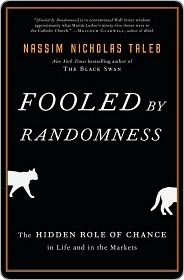More on this book
Community
Kindle Notes & Highlights
Likewise, an increase in personal performance (regardless of whether it is caused deterministically or by the agency of Lady Fortuna) induces a rise of serotonin in the subject, itself causing an increase of what is commonly called “leadership” ability. One is “on a roll.”
“never ask a man if he is from Sparta: If he were, he would have let you know such an important fact—and if he were not, you could hurt his feelings.”
It is a fact that our brain tends to go for superficial clues when it comes to risk and probability, these clues being largely determined by what emotions they elicit or the ease with which they come to mind. In
it is also a scientific fact, and a shocking one, that both risk detection and risk avoidance are not mediated in the “thinking” part of the brain but largely in the emotional one (the “risk as feelings” theory). The consequences are not trivial: It means that rational thinking has little, very little, to do with risk avoidance. Much of what rational thinking seems to do is rationalize one’s actions by fitting some logic to them.
Einstein’s remark that common sense is nothing but a collection of misconceptions acquired by age eighteen.
Our minds are not quite designed to understand how the world works, but, rather, to get out of trouble rapidly
Those who were unlucky in life in spite of their skills would eventually rise.
“For the gods perceive things in the future, ordinary people things in the present, but the wise perceive things about to happen.” Cavafy wrote: In their intense meditation the hidden sound of things approaching reaches them and they listen reverently while in the street outside the people hear nothing at all.
“Since not more than 50 percent of the individuals can be wealthier than average.” Of course, more than 50% of individuals can be wealthier than average.
Theories that are known to be wrong, as they were tested and adequately rejected (he calls them falsified). Theories that have not yet been known to be wrong, not falsified yet, but are exposed to be proved wrong.
These are men with bold ideas, but highly critical of their own ideas; they try to find whether their ideas are right by trying first to find whether they are not perhaps wrong. They work with bold conjectures and severe attempts at refuting their own conjectures.
The simple notion of a good model for society that cannot be left open for falsification is totalitarian.
The philosopher Pascal proclaimed that the optimal strategy for humans is to believe in the existence of God. For if God exists, then the believer would be rewarded. If he does not exist, the believer would have nothing to lose.
There is a category of people, generally finance academics, who, instead of fitting their actions to their brains, fit their brains to their actions. These people go back and unwittingly cheat with the statistics to justify their actions.
Monsieur de Norpois was not lying. He had just forgotten. One forgets rather quickly what one has not thought about with depth, what has been dictated to you by imitation, by the passions surrounding you. These change, and with them so do your memories. Even more than diplomats, politicians do not remember opinions they had at some point in their lives and their fibbings are more attributable to an excess of ambition than a lack of memory.
An optimizer, by comparison, is the kind of person who will uproot himself and change his official residence just to reduce
his tax bill by a few percentage points. (You would think that the entire point of a higher income is to be free to choose where to live; in fact it seems, for these people, wealth causes them to increase their dependence!)


